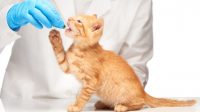In fact, the parvo symptoms in cats and dogs might be very different, although they are caused by the viruses that are closely related. Parvo in cats can be very dangerous and fatal. Here are some important things you should know about parvo, starting from the definition, symptoms, treatment, and prevention.
The definition
Parvo is a digestion infection caused by a virus called Feline Panleukopenia Virus (FPV). FPV, also referred to as feline distemper, is one of the most life-threatening and highly contagious diseases in cats. FPV works by killing all the body’s defense cells then make the cats are more open to another infection. It is because their blood cells are attacked which may cause them to get anemia. The unvaccinated cats and kittens (ages 2 to 6 months) are at the highest risk for getting infected by this virus. They may get infected once they are in contact with infected parvo poop, urine (any other bodily fluids), or blood. The other cause comes from infected people or materials, such as toys, equipment, bedding, etc.
The common symptoms
Parvo symptoms in cats are various, and sometimes the cats don’t show any signs. However, if they show the symptoms, these may include lethargy, watery diarrhea (or even bloody), losing appetite (lead to the weight loss), vomiting, high fever, dehydration, anemia, as well as neurological symptoms. The critical time for parvo in cats is pretty short: only 24 hours. If your infected cats do not get any right treatment in 24 hours, their life is endangered.
The treatments
Whenever you spot any parvo symptoms in your pets, be sure to see a vet immediately. In most cases, the affected cats will need hospitalization since they should be infused to fulfill the nutrition. In addition, the cats will also need to be isolated because parvovirus is extremely resilient and can live up to a year or even years on the ground. If your cats are not isolated, other cats will be highly risked to get infected.
The prevention
To minimize the chance of your cats getting infected by FPV, you can follow the veterinarian’s suggestion and take your cats to get vaccinated. Moreover, whenever you touch them, make sure to wash your hands properly with soap before and after touching them. In this way, you can minimize the chance of passing parvo symptoms in cats from the affected pets to other healthy pets.







